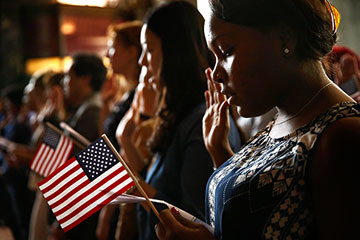
Vishaun Lawrence of Jamaica during a naturalization ceremony in Chicago last year.
(7 of 8)
Which is not to say culture is meaningless--even if "bad culture" is a convenient way to throw blame at struggling groups, as opposed to dealing with the structural causes behind those groups' disparate outcomes. We all have a linguistic, religious, racial, ethnic or national culture that shapes much about us. The cultural values of a group are an important part of the answer to the question of why certain groups seem to do better, at particular times, than others.
But cultural values are never the whole answer--even as we've come to privilege them over all other explanations for success and failure, such as political and economic ones. And culture is rarely either an unambiguously good force or an unambiguously bad one. Thus, Confucian values of education and family fealty certainly are one factor in explaining why Chinese students from low-income backgrounds do better than their peers. But as we've seen, that's not the whole story. Meanwhile, many in China would like to see less conformity in their culture, believing that it inhibits much of the freethinking that powers creativity and innovation in America and that it results in a citizenry that passively tolerates suppression of dissent and censorship of the Internet.
Chua and Rubenfeld make another mistake when they try to set up a hierarchy of good culture vs. bad culture--in which good culture invariably means getting rich. They take their definition of success from that of Oliver Wendell Holmes Sr.: "the gaining of money and position." Nowhere are cultural traits like kindness, community and public service or martial valor given any value.
Immigrants, claim Chua and Rubenfeld, are wary of "an excessively permissive American culture"--the bogeyman that haunts the dreams of so many who see the U.S. as losing the vigor of a former age. But isn't that permissiveness exactly what makes America work: this messy mix, this barbaric yawp, this redneck rondeau, this rude commingling? Isn't that what permeates its films, movies, books? And isn't that the principal product it can still export? It is American culture's permissiveness, its new world energy, that still attracts the masses to the "golden door."
As it did with my father, who in college in 1950s Calcutta was first exposed to the great rock-'n'-yell of Chuck Berry and Elvis--music the Jesuit deans of St. Xavier's tried to ban because they couldn't stand to see students gyrating their pelvises. My father had never heard such an awesome caterwaul before, and--along with America's decadent movies and books--it seeded the young man's desire to go live there someday.
It's not conformity that makes this country great; it's an individual striking out against the expectations of his culture, Bill Gates and Mark Zuckerberg dropping out of Harvard, Miles Davis coming out of heroin addiction to produce 'Round About Midnight, the 14-year-old Billie Holiday turning the pain of her childhood into the bluest beauty, Sylvia Plath taking on death with pills and poetry, William S. Burroughs writing from the bowels of his addiction in Naked Lunch; it's Hemingway and Fitzgerald and Cheever and Carver drinking and writing, writing and drinking through their demons. Imagine what American culture would be if American artists had kept a tight check on their impulses.
